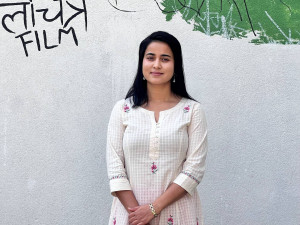Culture & Lifestyle
Seeking silence amid noise
As life becomes increasingly overwhelming, more people are seeking clarity, calm, and self-connection through meditation retreats and spiritual courses.
Reeva Khanal
Imagine stepping away—not just from the noise, but from the notifications, the pressure, and the constant need to keep up. No screens, no deadlines, no need to explain yourself. A space where you don’t have to perform, impress, or even speak—not even to those around you.
Meditation centres and spiritual retreats offer a space for this kind of inward journey. These aren’t just quiet getaways—they’re structured environments that encourage deep personal reflection and awareness. What these retreats offer is not escape, but confrontation—space to witness the noise within, to reset thought patterns, and to experience stillness without needing to achieve or explain. For many, these practices become a way to reconnect with themselves and life itself—more slowly, more presently.
Pragya Rai, a businesswoman who has explored various meditative practices, speaks passionately about the growing disconnect between outward success and inner contentment. “We live in a world where success is defined by money, achievements, and likes on social media. But no one asks whether we’re actually happy inside,” she shares. She feels that in the relentless chase for a particular idea of happiness, many of us forget to ask the deeper questions: Why am I here? What makes me truly happy?
Her journey with meditation began through the Aishwarya Vigyan course, helping her find clarity. Rai believes this course is especially vital for today’s youth, many eager to go abroad chasing money without pausing to understand what they want from life. “This course isn’t about rejecting ambition,” she explains, “It’s about clarifying it—figuring out your passion and how you want to live.” Having attended several week-long courses and Osho meditation sessions, Rai says each experience helped her shed distractions and embrace a more authentic self.
Curiosity brought Rachana KC, a student of the Presidential Graduate School and now a marketing and communications executive, into the world of meditation. What was supposed to be a one-week retreat quickly stretched into a whole month. “The first few days felt a bit off—I even thought it was boring,” she shares, “but slowly, this inner calm began to settle in.” It was the first time she felt connected to herself. That experience stayed with her so deeply that she returned not just as a participant but as an instructor.
As a yoga and meditation teacher at Jeevan Vigyan today, KC often reflects on how much of her past life felt reactive and overstimulated. “Now, I’ve learned to let things be,” she says. Breathwork and awareness practices have helped her process emotions without judgment, remain grounded in the present, and approach life more gently. “It’s not about changing everything. It’s about noticing. And that, in itself, changes everything.”
Silence, too, is finding a renewed place in people’s lives—not just as a spiritual experiment, but as a survival tool in today’s fast-paced world. As more people battle emotional overwhelm, digital fatigue, and lifestyle burnout, retreating into stillness is no longer just for the spiritually inclined. For many, it has become a necessity. Practices like Vipassana and Jeevan Vigyan offer something medicine often can’t: better sleep, less anxiety, a return to wholeness—without prescriptions.
A typical day on retreat flows with quiet rhythm: yoga in the morning, spiritual discourse, breath-based meditations, and time to simply be. In that quiet, something begins to shift. People often describe a sense of hearing their thoughts for the first time—of tuning in rather than tuning out. As silence deepens, a sense of compassion, gratitude, and emotional strength starts to rise. The return to the present, as many describe, becomes the most beautiful shift of all.
“People don’t just want peace—they’re yearning for it,” says Santosh Khadka, a visiting faculty member at Tribhuvan University who teaches sustainable tourism, as well as a seasoned trainer and coordinator at Jeevan Vigyan. With over 15 years’ experience as a career coach and counsellor, and as the host of the talk show The Career Dream on Mega TV HD, Khadka brings a unique perspective to meditation and mental wellness.
He explains that humans are naturally spiritual beings, drawn to nature, but modern life—with its constant noise, screens, and fast food—has pulled many away from that core. “Everyone wants stability, wellness, and joy, but we’re chasing it outside. These practices—Vipassana, Jeevan Vigyan, and others—offer something priceless: the chance to come back to yourself.” Having practised Vipassana himself, Khadka notes that people leave these courses with more than just relaxation. “Some find better sleep, some heal without medication. It’s a full-body shift—mental, emotional, and physical.”
What goes on inside those silent retreats? “It’s surprisingly joyful,” he says. “The days flow with yoga, meditation, and spiritual discussions. But the real magic starts when the silence sets in. You begin to meet yourself in ways you never expected.” That stillness, he adds, unlocks compassion, resilience, and presence. “You start noticing your thoughts, your words, your actions—and with that awareness comes power.” For Khadka, meditation isn’t just an add-on for mental health—it’s central to it. “When you stop the noise and listen to yourself, balance follows. That’s what people are searching for—peace, not performance.”
More and more people today are choosing silence—not as an escape, but as a way to remember who they are. In a world obsessed with comparisons and constant noise, we’ve forgotten how to simply be. We are all complex, beautiful beings—with flaws, strengths, doubts, and dreams. But somewhere along the way, we stopped seeing ourselves clearly. Stillness gives us that space—to pause, to reflect, and to reconnect with the goodness that already lives within us.




 12.12°C Kathmandu
12.12°C Kathmandu















